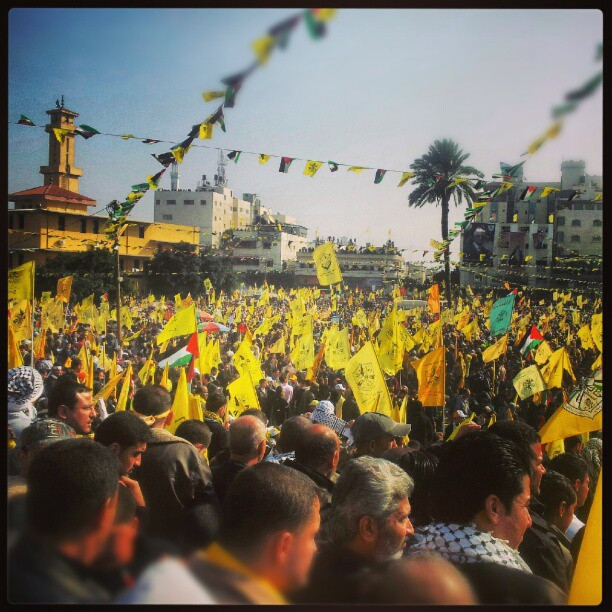Palestinian Factions Hamas And Fatah Look To Bury The Hatchet

Palestinian factions Hamas and Fatah seem to be on the verge of reconciling after years of rivalry and stalled peace talks.
Hamas, the more militant and Islamist of the two parties, won a majority in the Palestinian parliament in 2006, prompting a split that sometimes erupted into violent conflict, and which left Hamas in control of Gaza City and Fatah dominating the West Bank.
But this week, yellow Fatah flags were abundant in Gaza City in celebration of the 48th anniversary of the party's founding, one month after Hamas held its own rally in the West Bank. Both the United Nations' upgrade of Palestine to nonmember observer status and Hamas' rocket attacks on Jerusalem and Tel Aviv have emboldened both parties. Now leaders from both sides are expected to sit down for reconciliation talks overseen by the Egyptian government.
“The climate is excellent for reconciliation,” Fatah leader Nabil Shaath told the New York Times on Friday. “I don’t think there are any more organizational issues to be settled; what is needed is to sit down and write a political program. Cairo remains the best chaperon for this.”
Hamas and Fatah have made attempts at unification before, signing a reconciliation agreement in May 2011 to form a joint government and hold elections in 2012. But unity has been met with roadblocks both figurative and literal -- in 2012, Fatah accused Hamas security forces of limiting Fatah party members' movements and arresting them.
Both the Israeli and U.S. Governments are wary of the prospect of a unified Palestinian leadership. When asked for thoughts on the two Palestinian factions' display of unity, State Department spokesperson Victoria Nuland said America's position on Hamas hasn't changed.
“There has to be a commitment to non-violence. There has to be a willingness to recognize the state of Israel, and there has to be an acceptance of previous obligations,” Nuland said, according to the Jewish Press. “So the fact that they [Fatah] were allowed to go celebrate their birthday in Gaza doesn’t change our view on whether or not and under what conditions we would see Hamas able to play a positive role in the Palestinian Authority.”
In December, Israeli prime minister Benjamin Netanyahu condemned Palestinian Authority president Mahmoud Abbas for reaching out to Hamas, after Hamas leader Khaled Mashaal promised to liberate Palestine “from the sea to the river” and said Hamas was “not giving up any inch of Palestine,” according to the Times of Israel.
But Israeli President Shimon Peres has sounded a more diplomatic note.
“Khaled Mashaal is not my first choice for dialogue,” Peres told the Times of Israel in December. “He lives in another era of death and blood, but if we have to, I will talk with him.”
However, while holding rallies is one thing, true political unity is quite another. It remains to be seen how Fatah and Hamas can reconcile their differing views on both internal governance and how to approach relations with Israel.
“What we see now is some kind of moral reconciliation,” Al Azhar University political scientist Mkhaimar Abusada told the New York Times. “Hamas and Fatah are no longer inciting against each other, Hamas and Fatah are no longer accusing each other, but the big issues have not been tackled yet.”
© Copyright IBTimes 2024. All rights reserved.





















